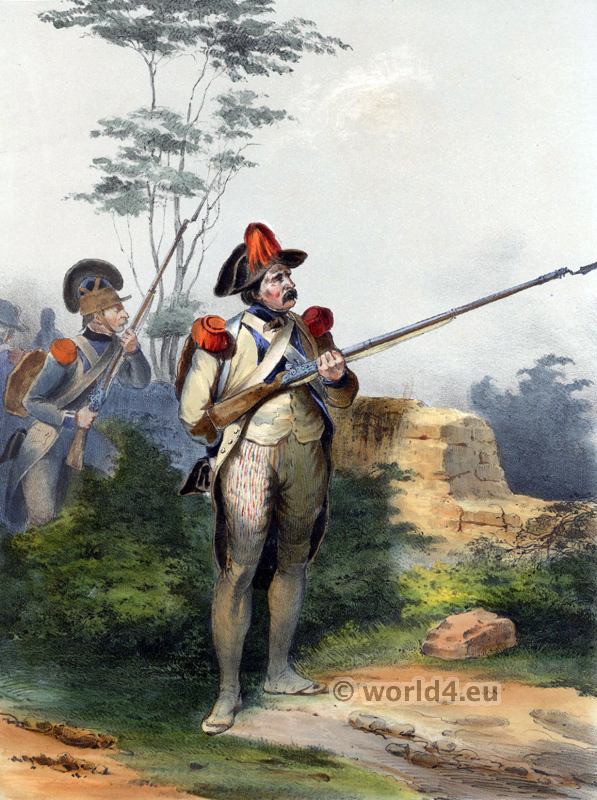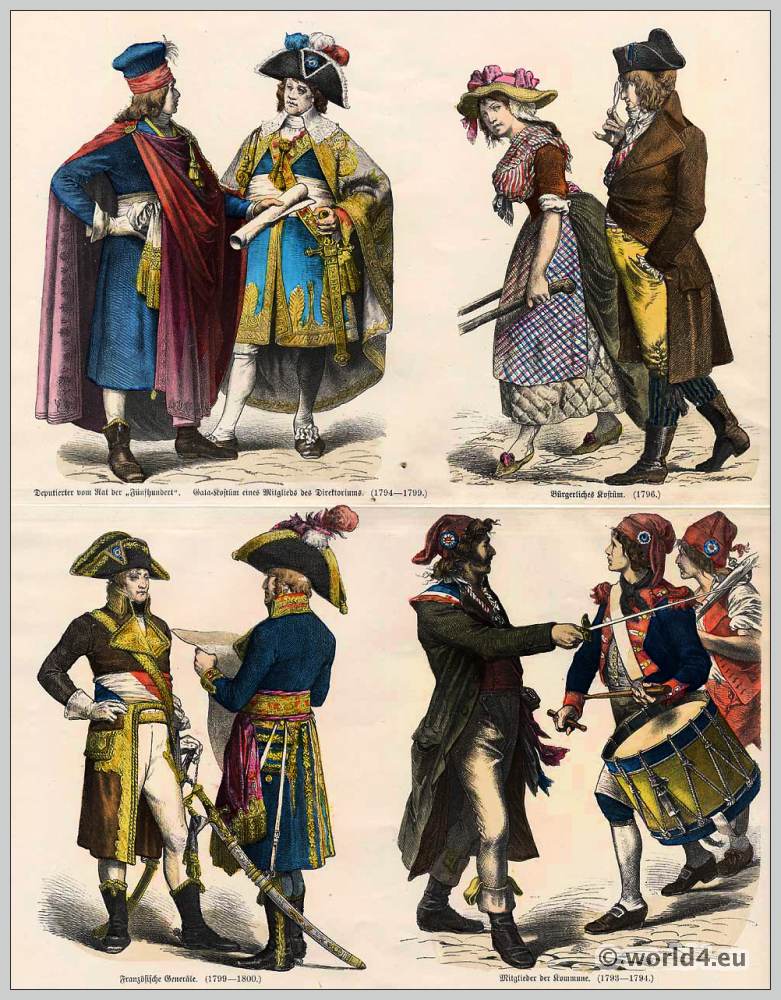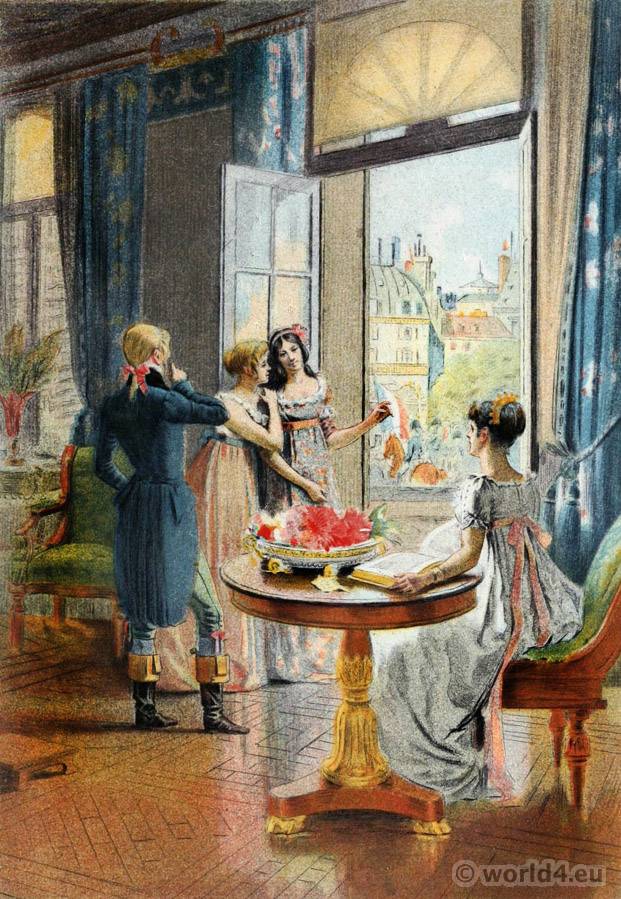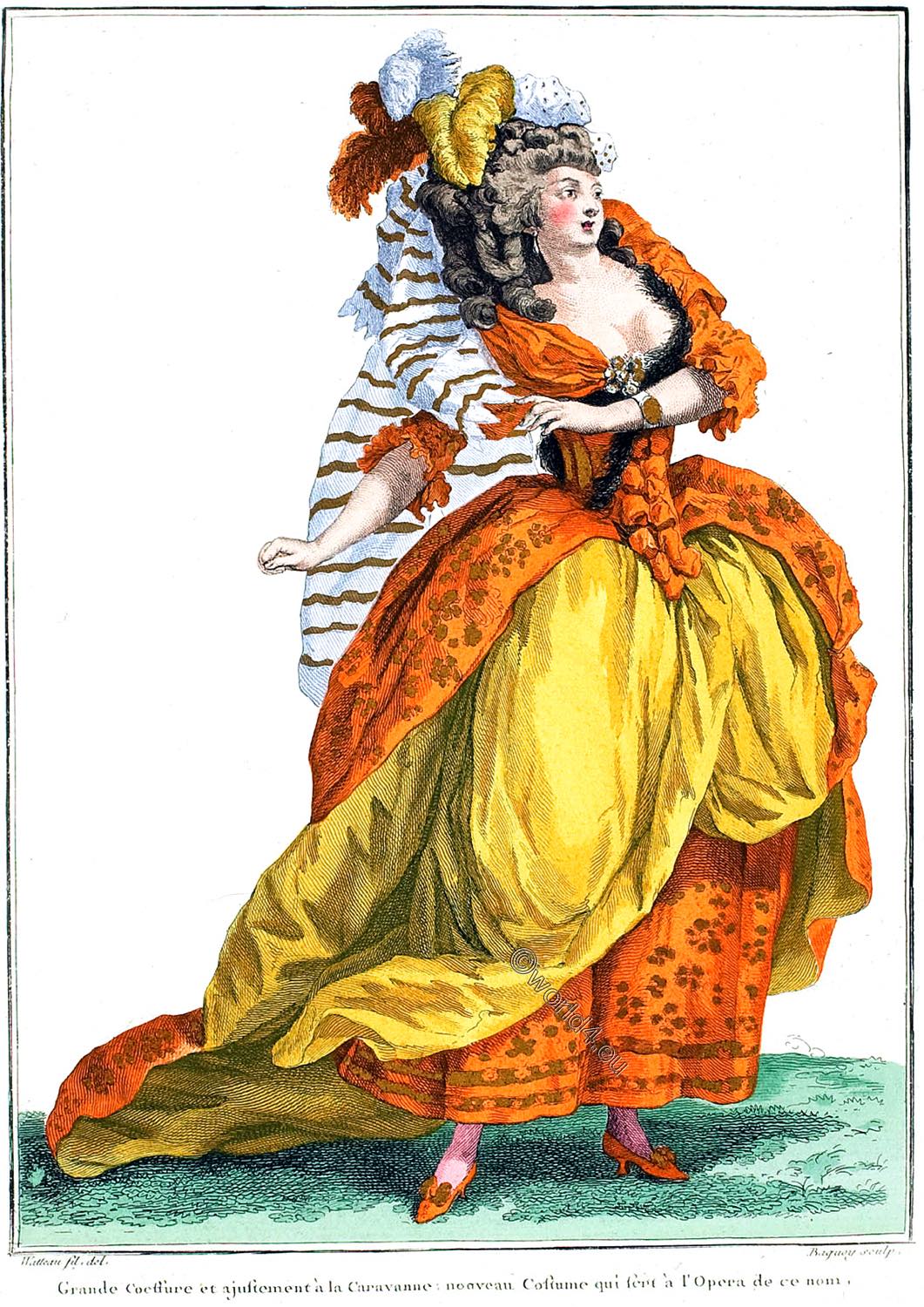
Timeline of the French Revolution 1789 – 1799
1789
- January 24, 1789 – the beginning of the election to the French Estates General or States-General (Les États-Généraux de 1789).
- April 28, 1789 – Réveillon Riot in Paris – crowd stormed the house of the wallpaper manufacturer Réveillon.
- May 5, 1789 – Louis XVI opened the French Estates General (États Genereaux) in Versailles.
- June 17, 1789 – Third Estate in Versailles explained at the request of Sieyès to the National Assembly.
- June 20, 1789 – Tennis Court Oath in Versailles – National Assembly praised France for a constitution.
- June 22, 1789 – Part of the clergy join in Versailles the National Assembly. King Louis XVI disapproved resolutions of the National Assembly (June 23).
- June 25, 1789 – Riots in Paris and Versailles.
- June 27, 1789 – Nobility and clergy join on the orders of Louis XVI at Versailles the National Assembly.
- July 9, 1789 – National Assembly in Versailles explained to the Constituent National Assembly. The National Assembly at the request of Mirabeau to Louis XVI against military buildup.
- July 11, 1789 – Louis XVI dismisses and refers Finance Necker from France. riots (Desmoulins) in Paris on the news of the banishment of Necker (12- 13 July).
- July 14, 1789 – Storming of the Bastille (Prise de la Bastille) in Paris. Fortress Commander Bernard-René Jordan de Launay † and Jacques de Flesselles † (Head of the Parisian merchants and Head of State of Paris), Joseph Foullon de Doué (the Secretary of State) amongst others, are massacred.
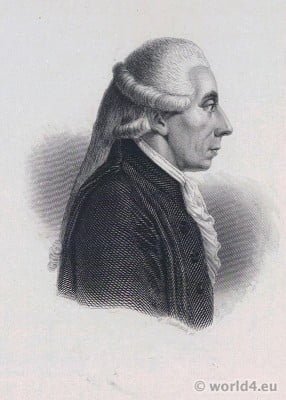
- July 15, 1789 – Nomination of Marie-Joseph Motier, Marquis de La Fayette or Lafayette as Commandante of the National Guard at Versailles. Louis XVI appoints Jean-Sylvain Bailly as mayor of Paris and recalls Minister Jacques Necker from Basel.
- July 17, 1789 – Louis XVI draws in Paris and returns to Versailles. Louis V. Joseph de Bourbon, prince de Condé and Charles Philippe of France, Count of Artois flee from France (15 July), to Turin.
- 19 July-5 August 1789 – Peasant uprisings in rural France – Grand Peru. Insurgents storming castles and monasteries – looting, arson and massacre.
- August 4, 1789 – August Decisions of the National Assembly in Versailles. Abolition of the feudal rights and privileges at the request of Louis-Marie de Noailles among others.
- August 26, 1789 – Declaration of the Rights of Man and of the Citizen of the National Assembly in Versailles. Proclamation by the National Assembly (August, 26) at the request of Lafayette (from 11 July).
- October 5, 1789 – The Women’s March on Versailles also known as The October March from Paris to Versailles. Relocation of the royal court and the National Assembly from Versailles to Paris (6. October). The Duke of Orléans is leaving France to England (to July 1790).
- October 19, 1789 – Founding of the club of the Jacobins in Paris.
- November 2, 1789 – The National Assembly in Paris decides the nationalization of the Church property.
- Dec 19 1789 – The National Assembly in Paris decides Act to issue assignats.
- December 22, 1789 – National Assembly in Paris decides division of France into 83 departments. Draft of the administrative division into departments, districts and cantons by Emmanuel Joseph Sieyès also known as the Abbé Sieyès.
1790
- February 3, 1790 – Decree of the National Assembly in Paris repealing monasteries and orders.
- March 8, 1790 – National Assembly in Paris approved St. Domingue (Haiti) its own parliament. Further decree for the execution of the Decree of 8 March on 28 March. Opening of the Colonial Assembly of St. Domingue (Haiti) in Saint-Marc on 16 April 1790th
- 28th March. 1790 – Decree of the National Assembly in Paris for the execution of the Decree of March 8. The decree is ambiguous among others concerning suffrage and rights of colored people in the colonies.
- April 27, 1790 – Founding of the club of the Cordeliers in Paris.
- June 19, 1790 – The National Assembly in Paris decides the abolition of titles of nobility in France.
- July 12, 1790 – The National Assembly in Paris adopted the Civil Constitution of the Clergy. Proclamation of the Civil Constitution of the Clergy on Aug 24
- July 14, 1790 – Fédération on Mars field in Paris.
- August 16, 1790 – National Assembly in Paris decides Abolition of the feudal rights in France.
- September 4, 1790 – Finance Minister Necker resigns and leaves Paris.
- November 27, 1790 – National Assembly in Paris decides swearing the clergy to civil Constitution. Much of the bishops and pastors refused the oath to the Civil Constitution of the Clergy.
1791
- April 2, 1791 – Honoré Gabriel de Riqueti, comte de Mirabeau † dies in Paris.
- May 15, 1791 – Decree of the National Assembly in Paris recognizes to free colored citizenship. Message arrives on June 30 in St. Domingue (Haiti) and dissolves riots among colonists. The decree is on Sep 24 1791 withdrawn and proclaimed again on April 4, 1792.
- June 21, 1791 – The escape of Louis XVI failed in Varennes (Varennes-en-Argonne). Louis XVI gets arrested and transported to Paris (June 25).
- July 16, 1791 – Founding of the Club of Feuillants in Paris.
- July 17, 1791 – Champ de Mars Massacre in Paris. The French National Guard (Lafayette) knocks antimonarchical demonstration.
- July 24, 1791 – Popular referendum for the connection of Avignon and Comtat Venaissin to France.
- August 27, 1791 – Declaration of Pillnitz of Austria and Prussia against France. Conference of Pillnitz near Dresden (Leopold II / Frederick William II / Provence / Artois) of 25 to Aug. 27 Statement by Austria and Prussia in support of Louis XVI against the French Revolution.
- Sept. 3, 1791 – National Assembly in Paris adopted Constitutional constitution for France.
- Sept. 7, 1791 – Declaration of women rights by Olympe de Gouges in Paris.
- Sept. 14, 1791 – Swearing by King Louis XVI in Paris on the constitutional government.
- Sept. 14, 1791 – National Assembly in Paris decides the connection of Avignon and Venaissin to France.
- Sept. 24, 1791 – National Assembly in Paris canceled the decree of 15 May for equality of the colored people. The decision on civil rights of colored people is transferred to the colonial assemblies.
- October 1, 1791 – Opening of the Legislative Assembly (legislature) in Paris.
- Oct. 16- 17, 1791 – Riots in Avignon – massacres of La Glacière (Massacre de la Glacière).
- November 14, 1791 – Jérôme Pétion de Villeneuve is elected as mayor of Paris after the resignation of Bailly.
1792
- March 15, 1792 – Louis XVI convenes in Paris the Girondist Minister Roland, Dumouriez, Clavière among others.
- April 4, 1792 – Decree of the National Assembly in Paris for equal rights for the ‘free colored’.
- April 20, 1792 – France declares war on Austria. National Assembly in Paris decides declaration of war against Austria.
- April 20, 1792 – The mugger Pelletier † is executed in Paris with a guillotine. He is the first person which is executed in this way in Paris.
- June 20, 1792 – Riots in Paris – First storm of the Tuileries.
- August 10, 1792 – Storming of the Tuileries in Paris (Prise des Tuileries). French National Assembly suspended the monarchy – Louis XVI was imprisoned in the Temple.
- Sept. 2nd to 6th, 1792 – September Massacres (Massacres de Septembre) in Paris. The crowd stormed prisons and monasteries and killing political opponents (c. 2000 †) – lootings.
- Sept. 3rd to 15th, 1792 – Elections to the French National Convention.
- September 21 1792 – Opening of the French National Convention in Paris. Abolition of the monarchy (Sept. 21) – National Convention proclaimed the French Republic (Sept. 22).. 3rd to 15th Sept. 1792 – elections to the French National Convention.
- October 2, 1792 – Convention in Paris formed the Security Committee (1st session on October 17).
- November 27, 1792 – Convention in Paris decides connecting of Savoy to France (Dep Mont-Blanc.).
- December 15, 1792 – Decree of the Convention in Paris on the introduction of democracy in the occupied territories.
1793
- January 21, 1793 – Execution of Louis XVI † in Paris.
- January 30, 1793 – Decree of the Convention in Paris to connect the County of Nice to France.
- February 24, 1793 – National Convention in Paris decides cancellation of 300,000 recruits.
- February 25, 1793 – Riots and pillages in Paris – Shop storm.
- March 10, 1793 – Convention in Paris formed the Revolutionary Tribunal (Extraordinary Court). The revolutionary tribunal in Paris March 10, 1793 – Convention in Paris image Revolutionary Tribunal (Extraordinary Court). The revolutionary tribunal in Paris leaves (to 10th June 1794) executed 2600 † people.
- March 23, 1793 – Decree of the Convention in Paris on connecting the Rauracian Republic (Dep Mont-Terrible.).
- April 1, 1793 – Proclamation of General Dumouriez in Saint-Amand-les-Eaux. Charles-François Dumouriez, Général en chef de l’Armée du Nord explained against the Convention and for the constitutional government of 1791.
- April 6, 1793 – National Convention in Paris formed Welfare Committee (chaired Georges Danton).
- April 15, 1793 – Former Governor of St. Domingue Philippe (or Philibert) François Rouxel, viscount de Blanchelande † is executed in Paris.
- May 4, 1793 – Convention in Paris sets cap on food prices – Small Maximum Act.
- May 18, 1793 – National Convention in Paris constitutes “Commission of the Twelve”. Formation of an extraordinary commission to investigate conspiracies.
- May 22, 1793 – General Joseph Miączyński † is executed in Paris on the guillotine. During the French Revolution, he served in the Army of the North under General Dumouriez.
- May 27, 1793 – Riots in Paris – crowd storms the Convention.
- May 29, 1793 – Uprising in Lyon against the Jacobin Convention.
- 31 May-2 June 1793 – Uprising of sans-culottes in Paris – the Downfall of of the Gironde. Dissolution of the “Commission of the Twelve” and arrest of Girondins – beginning of Jacobin dictatorship.
- June 3, 1793 – Uprising in Marseille against the Jacobin Convention.
- June 24, 1793 – Convention in Paris adopts Republican Constitution – Constitution of the 1793rd. Convention constitutes constitution to a peace agreement – Constitution never enter into force.
- July 5, 1793 – Nantes declared against the Jacobin Convention.
- July 10, 1793 – Jacobin change in the Welfare Committee in Paris (Danton ruled out).
- July 13, 1793 – Jean Paul Marat † is murdered in Paris assassinated by Charlotte Corday.
- July 14, 1793 – Nantes submits to the Jacobin Convention.
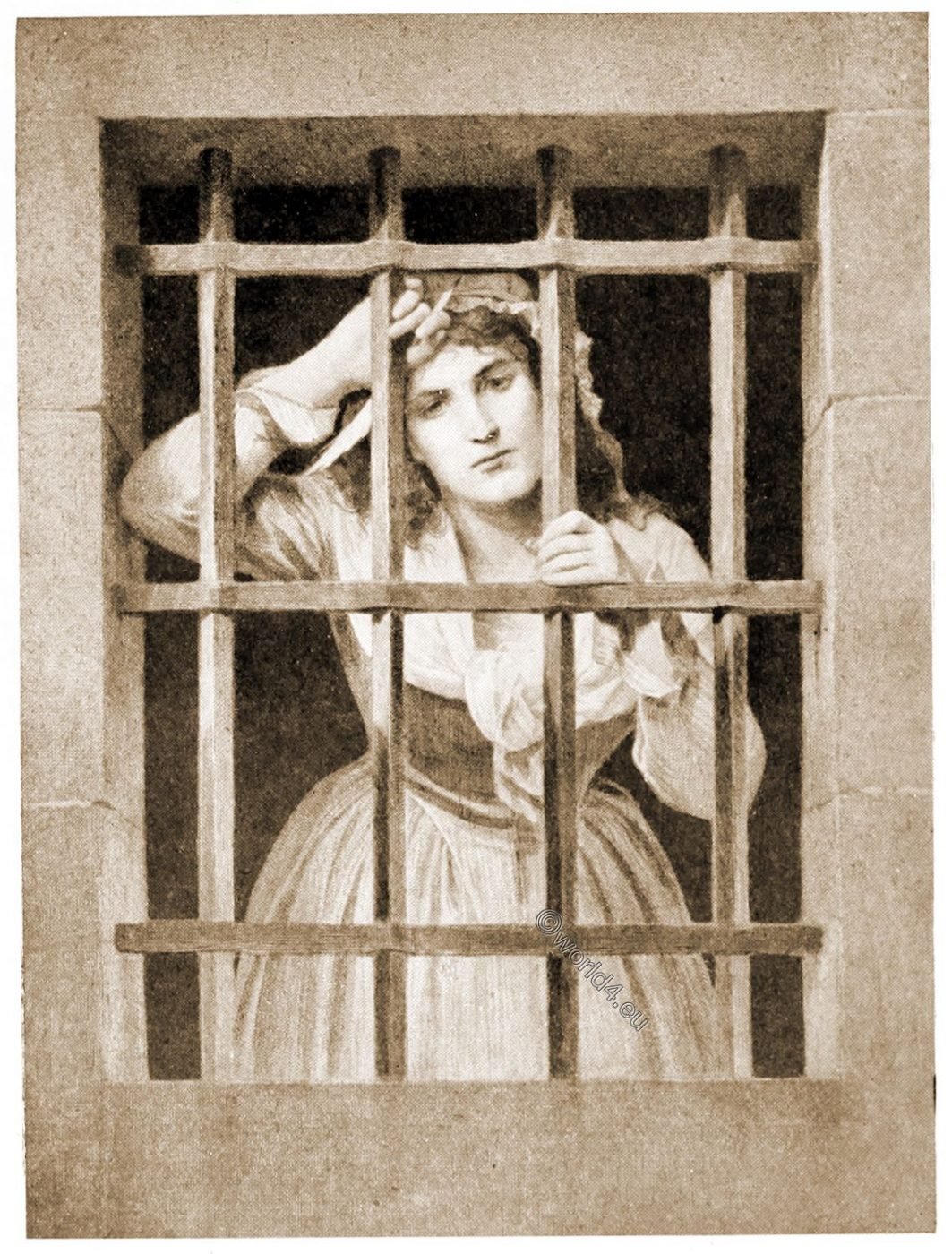
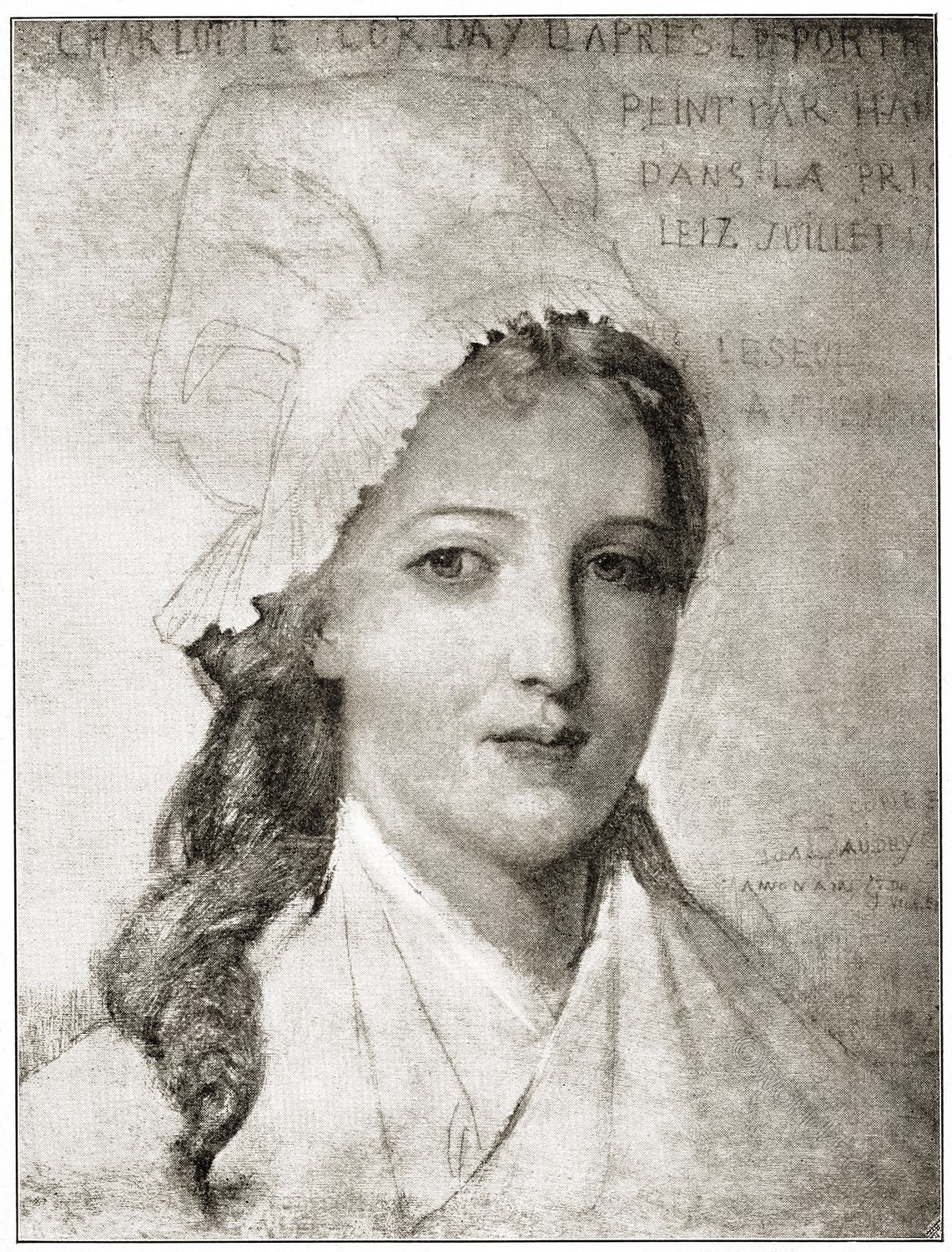
From the copy by Baudry of the only authentic portrait, painted in her prison. Carbon print by Braun, Clément & Co. Source: The stones of Paris in history and letters by Benjamin Elli Martin, Charlotte Martin. New York: Scribner, 1909.
Marie Anne Charlotte Corday d’Armont, usually called Charlotte Corday for short, was a French noblewoman and great-granddaughter of the playwright Pierre Corneille.
She gained notoriety during the French Revolution for the assassination of the radical journalist, politician and naturalist Jean Paul Marat.

- July 21, 1793 – Uprising in Toulon against the Jacobin Convention.
- July 25, 1793 – Frz. Republic (Carteaux) takes Avignon.
- July 27, 1793 – Maximilien de Robespierre assumes in Paris to chair the Committee of Public Welfare.
- August 1, 1793 – Convention in Paris decides war of extermination against the turn. August 1, 1793 – Convention in Paris decides introduction of decimal metrical system.
- August 8, 1793 – Frz. Republic (Kellermann / Dubois-Crancé) blocked Lyon.
- August 15, 1793 – Frz. Republic (Kellermann) bombards Lyon. Heavy bombardment from Aug. 22nd, (with brief interruptions) until Oct. 8th.
- August 23, 1793 – Convention in Paris decides universal conscription (levée en masse).
- August 25, 1793 – Frz. Republic (Carteaux) takes Marseille.
- August 28, 1793 – General Adam-Philippe de Custine † is executed in Paris on the guillotine.
- August 28, 1793 – Insurgents of Toulon passed fortresses, port and fleet to the British-Spanish fleet.
- September 5, 1793 – Convention in Paris decides terrorism measures to suppress the counter-revolution.
- September 17th 1793 – Convention adopted in Paris Suspects Law.
- September 29th 1793 – Convention in Paris sets upper limit for consumer goods – Large Maximum Act.
- October 5, 1793 – Convention in Paris decides the 2nd Republican calendar.
- October 9, 1793 – French Republic (Doppet/ Couthon) takes Lyon.
- October 10, 1793 – Committee of Public Safety in Paris receives full powers. Provisional Revolutionary Government until peace agreement.
- October 12, 1793 – Convention in Paris adopts decree on the destruction of Lyon. Convention deploys (October 29,) the commissioners Collot d’Herbois and Fouché to Lyon (16th to November).
- October 16, 1793 – Execution of Marie Antoinette † in Paris.
- October 31, 1793 – Execution of Jacques Pierre Brissot †, Armand Gensonné †, Pierre Vergniaud †, Jean Étienne Benoît Duprat † and further Girondins in Paris.
- November 3, 1793 – Revolutionist, feminist, writer and author, Olympe de Gouges † is executed in Paris on the guillotine.
- November 6, 1794 – Louis Philippe II, Duke of Orléans † and † Pierre Coustard be executed in Paris on the guillotine.
- November 10, 1793 – Notre-Dame in Paris rededicated to “temple of reason and freedom”.
- November 12, 1793 – Jean-Sylvain Bailly † will executed in Paris on the guillotine.
- November 15, 1793 – General Brunette † will executed in Paris on the guillotine.
- November 15, 1793 – Commissioners of the Convention (Collot d’Herbois / Fouché) meet with 3,000 men (Ronsin) in Lyon. Proclamation of the revolutionary government (Collot d’Herbois / Fouché) in Lyon (Nov. 16) Destruction of churches and homes – mass executions (c. 1700 † amplified from 4th Dec.).
- November 17, 1793 – General Houchard † will executed in Paris on the guillotine.
- November 17, 1793 – the start of mass executions by drowning in Nantes (Noyades de Nantes). French Republic (Carrier) leaves 90 priests in the Loire drown (Première noyade de Nantes).
- November 27, 1793 – General Lamarlière † will executed in Paris on the guillotine.
- Dec. 4th, / 5th, 1793 – The beginning of the mass executions (Fouché / Collot Herbois) in Lyon.
- December 8, 1793 – Madame Dubarry † will executed in Paris on the guillotine.
- Dec 14, 1793 – mass executions (Collot d’Herbois) in Lyon (935 †).
- Dec 19 1793 – mass executions (Barras / Fréron) to Toulon (800 † until end December 1793).
- 29 to 31 December 1793 – French Republic (Carrier) executed 320 † in Nantes.
- Dec 1, 1793 – General Biron † will executed in Paris on the guillotine.
1794
- January 1st to 8th, 1794 – mass executions by French Republic (Carrier) in Nantes.
- January 4, 1794 – General Luckner † will executed in Paris on the guillotine.
- January 17, 1794 – Frz. Republic (Turreau) are command to march the 12 Hell columns (Colonnes infernales).
- January 7th to 19th, 1794 – Frz. Republic (Carrier) executed 350 † Vendéens in Nantes.
- January 29, 1794 – General Marcé † will executed in Paris.
- February 4, 1794 – Convention in Paris decides the abolition of slavery.
- March 24, 1794 – Execution of Hébertists (Hébert †, Desfieux †, Koch †, Rosin †, among others) in Paris.
- March 30, 1794 – Danton gets arrested on adoption of the Welfare Committee in Paris.
- April 5, 1794 – Execution of Dantonists (Danton †) in Paris. Execution of Hérault †, Desmoulins †, Delacroix †, Philippeaux †, Basire † and General Westermann †.
- 12 April. 1794 – General Cameron † will executed in Paris on the guillotine.
- April 13, 1794 – Generals Beysser †, Dillon † among others be executed in Paris on the guillotine.
- April 23, 1794 – Chrétien-Guillaume de Lamoignon de Malesherbes † will executed in Paris on the guillotine.
- May 8, 1794 – Antoine Laurent de Lavoisier † will executed in Paris on the guillotine.
- May 10, 1794 – Élisabeth Philippine Marie Hélène de Bourbon, called Madame Élisabeth † (Sister of Louis XVI) will executed in Paris on the guillotine.
- May 27, 1794 – General Donadieu † will executed in Paris on the guillotine.
- June 4, 1794 – Robespierre appointed in Paris Chairman of the Convention.
- June 8, 1794 – Festival of the Supreme Being in France.
- June 10, 1794 – Convention adopted in Paris decree of 22 Prairial – Grande Terreur (to July 27). Death penalty for enemies of the people – mass executions in Paris in 1400 † (to July 27).
- June 27, 1794 – Philippe de Noailles, duc de Mouchy and Claude-Victor de Broglie were executed in Paris on the guillotine.
- July 2, 1794 – Generals Aoust and Delattre be executed in Paris on the guillotine.
- July 22, 1794 – General Deflers will executed in Paris on the guillotine.
- July 23, 1794 – General Beauharnais and Frederick III of Salm-Kyrbug be executed in Paris.
- July 27, 1794 – coup of 9th Thermidor in Paris – fall of the Jacobins (Robespierre). Robespierre, Saint-Just, Hanriot, Couthon, Lebas among others Jacobins arrested. End of the Jacobin rule and the Grande Terreur – beginning of Thermidorians convent.
- July 28, 1794 – Execution of Robespierre and other Jacobins in Paris. Execution of Saint-Just †, Hanriot †, Couthon †, † Lebas, Fleuriot-Lescot †, Lavalette † among others. Execution of another 71 Jacobins in Paris (July 29).
- November 11, 1794 – Club of the Jacobins in Paris is closed.
- Dec 1, 1794 – Convention in Paris granted amnesty for insurgents of the turn.
- Dec 16, 1794 – Jean-Baptiste Carrier † (French Revolutionary and Member of the French National Convention, known for his cruelty to his enemies, especially to clergy.) will executed in Paris on the guillotine.
1795
- April 1, 1795 – Germinal uprising in Paris.
- April 19, 1795 – counterrevolutionaries riots Lons-le-Saunier.
- April 24, 1795 – counterrevolutionaries riots in Lyon.
- May 7, 1795 – Fouquier-Tinville will executed in Paris.
- May 10, / 11, 1795 – counterrevolutionaries riots in Aix-en-Provence.
- May 7, / 18, 1795 – Jacobin uprising in Toulon.
- May 20th to 23rd 1795 – Prairial uprising in Paris – sans culottes demanding bread and the Constitution of the 1793. Jacobin uprising (Goujon / Duquesnoy / Romme / Bourbotte / Soubrany) is deposited.
- May 31, 1795 – Fr. Republic (Isnard) takes Toulon and knocks uprising.
- June 5, 1795 – Massacre at Fort Saint-Jean in Marseille.
- June 8, 1795 – Louis Charles de Bourbon (Louis XVI) dies at the Temple in Paris.
- June 17, 1795 – Execution of the Jacobins Goujon, Duquesnoy, Romme, Bourbotte among others in Paris.
- June 27, 1795 – counterrevolutionaries riots in Avignon.
- 17 August 1795 – Commission of the eleven sets the directorial constitution for France before the Convention in Paris.
- August 22, 1795 – Convention adopted in Paris the directorial constitution (Constitution of the Year III). Proclamation of the Constitution on 23 Sep. – Last meeting of the Convention on Oct 26.
- September 23, 1795 – Convention in Paris proclaimed the directorial (Constitution of the Year III). Elections to the directorate from 12 to 31. October – Last meeting of the Convention on Oct 26.
- 4. / 5. Oct. 1795 – Vendemiaire revolt in Paris against the directorial. Republicans (Paul de Barras / Napoleon Bonaparte) beat down the uprising royalists (Danican).
- October 12, 1795 – the beginning of the elections in France (directorial).
- October 25, 1795 – Convention in Paris declared connecting of Belgium (Austrian Netherlands) to France.
- October 26, 1795 – Dissolution of the National Convention in Paris – directorial constitution enters into force. Formation of the 1st Directorate (Barras / Reubell / Carnot / Letourneur / Larevelliere) (October 31).
- November 4, 1795 – 1st Directorate (Barras / Reubell / Larevelliere / Carnot / Letourneur) meets in Paris.
- 1796
- February 27, 1796 – directorate in Paris includes the Club of the Pantheon (Baboeuf).
- March 2, 1796 – Bonaparte receives in Paris the supreme command of the French Army Italy.
- March 9, 1796 – Wedding in Paris of Napoleon Bonaparte and Josephine de Beauharnais.
- May 10, 1796 – Babeuf, Darthé, Buonarroti, Drouet II among others are arrested in Paris – Babeuf conspiracy.
- September 9th / 10th, 1796 – Uprising in the camp of Grenelle in Paris fails against the Directorate.
1797
- April 10, 1797 – Elections to the Legislative Councils (2nd directorate) in France.
- May 9, 1797 – General Masséna deliver to the directorate in Paris the peace preliminaries of Leoben.
- May 20, 1797 – formation of the 2nd Directorate (Barras / Reubell / Larevelliere / Carnot / Barthélemy) in Paris. Pichegru is elected President of the Council of the 500th.
- May 27, 1797 – Baboeuf and Darthé be executed in Vendôme.
- August 5, 1797 – General Augereau hits from Italy to Paris. Directorate appoints Augereau for head of the army of the interior (August 8).
- September 4 1797 – Coup of 18 Fructidor to Paris – cancellation of the elections to the directorate II.. Coup (Barras / Reubell / Augereau)> (Carnot / Barthélemy / Pichegru) Formation of III. Directorate (Barras / Reubell / Larevelliere / Merlin / Neufchâteau). Barthelemy, Pichegru, Willot among others be arrested and deported to Cayenne (11. October) in Guyana.
- 5 Dec. 1797 – General Bonaparte arrives in Paris.
- December 28, 1797 – directorate to Paris presents Vaud under his protection.
1798
- April 26, 1798 – connecting from Geneva to France (department of the lemma).
- May 11, 1798 – Coup of 22 Floréal to Paris. Directorate (Barras / Reubell / Larevelliere / Merlin) canceled elections.
- May 19, 1798 – French fleet (Bonaparte / Brueys) breaks from Toulon on for Egyptian campaign.
- June 8, 1798 – formation of the IV Directorate to Paris. 4th Directorate consists of Barras, Reubell, Merlin, and Larevelliere Treilhard.
- July 1, 1798 – France (Bonaparte) lands at Alexandria to Egypt. France (Bonaparte / Kléber / Menou) takes Alexandria (July 2). Mamelukes (Koraim Pasha) surrendered to France (Bonaparte).
- September 5 1798 – directorate to Paris adopts law on the extension of universal conscription. Directorate shall adopt conscription of 200,000 recruits.
1799
- May 17, 1799 – formation of the V. Directorate to Paris 5th Board consists of Barras, Sieyès, Larevelliere, Merlin and Treilhard.
- June 17, 1799 – formation of the VI. Directorate to Paris 6th Board consists of Barras, Sieyès, Larevelliere, Merlin and Gohier.
- 18. Juni 1799 – Coup d’état of the 30th Prairial in Paris. Coup d’état of the Council of 500 against the Directory. Resignation of directors Larevelliere and Merlin.
- June 20, 1799 – formation of the VII Directorate directorate in Paris.. 7th Board consists of Barras, Sieyès, Ducos, Moulin and Gohier.
- November 9, 1799 – Coup of 18 Brumaire to Paris – the end of the French Revolution. Dissolution of the Board and appointment of consuls (Bonaparte / Sieyes / Ducos) on Nov. 12.
- December 13, 1799 – Constitutional Commission to Paris adopted consular constitution. 2nd Consulate (from 15 Dec.) consists of Bonaparte, Lebrun and Cambacérès. Constitution shall enter into force on 25 Dec. 1799 and confirmed on 18 Feb. 18, 1800 by popular referendum.
Source: The history of the French Revolution 1789-1800 by Adolphe Thiers, Frederic Shoberl. Philadelphia: J.B. Lippincott, 1894.
Related
Discover more from World4 Costume Culture History
Subscribe to get the latest posts sent to your email.









